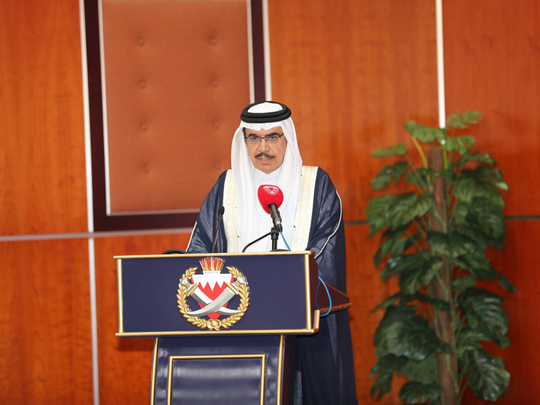
Manama: Iran has issued 124 statements hostile to Bahrain by senior officials in the first eight months of the year.
“We cannot forget the Iranian threat against our homeland security,” Interior Minister Shaikh Rashid Bin Abdullah Al Khalifa said.
“Iran’s policy of interference in Bahrain has become all the more clear through hostile statements of senior Iranian officials against Bahrain, based on religious sectarianism. There were around 124 such statements from January to August 2016.”
Shaikh Rashid also charged that Iran was harbouring fugitives who are planning and carrying out operations, inciting violence, training terrorists and financing terror operations.
“This has led us to introduce additional regulations in our dealings with Iran in order to limit interference in our internal affairs. We are a sovereign state governed by the rule of law. It is time for Iran to cease its interference and to respect our sovereignty,” Shaikh Rashid told a gathering of citizens that included religious scholars, Members of Parliament, the business community, editors-in-chief of local newspapers and representatives of National Institute of Human Rights, along with lawyers and heads of NGOs and youth centres.
The minister asked the meeting on Thursday to “discuss current security affairs, challenges and some of the steps that should be taken for a more secure future for Bahrain”.
“Regarding Bahrain’s security situation, we have put a difficult phase behind us and now have a significantly more stable environment with fewer surprises. Security in Bahrain is today as it has ever been. However, as law enforcement officials, we always keep an eye out for emerging challenges. There have been repeated attempts to lure policemen into situations in which they may lose control of their environment. Our goal has always been bigger than just the role of responding units as a marker for the victory of the state. We have been working towards an overall solution and a timeline in which to achieve general stability,” he said.
“As for some high-profile police activity over the past few months, it is important to point out that these were not impulsive actions, but the country is finalising steps and procedures to achieve security and stability and push forward development and reforms within national unity. Recent legal actions against organisations and individuals were not steps taken out of a desire for some sort of revenge or steps against a certain sect. They were the result of long-term investigations and legal action. In the meantime, we continue to handle issues that disrupt or affect national security, now and into the future. The law takes its own course.”
However, Shaikh Rashid deplored “some negative responses from some foreign countries regarding these recent cases”.
“In my opinion, these were biased stances based on inaccurate information or on misinformation provided by individuals who work against the state. We have noticed steps taken by countries worldwide that are similar to ours to protect their security and stability, and they were not criticised by anyone in the international community. In fact, some of those countries received offers of assistance and offers to prosecute lawbreakers who acted against the state,” the minister said.
The minister said that some people had acted against political reforms even though the positive changes were part of a national project and not an “imported initiative controlled by foreign influences”.
The reforms are built on robust and confident national foundations, he added.
“I maintain that anyone who conspired to overthrow the government or to carry out a coup is not in a position to be part of upcoming Bahraini politics or our country’s political future,” Shaikh Rashid said.
The minister said that sectarianism was among the top challenges to the nation.
“Can we afford to leave a risk such as sectarian extremism and hatred as a legacy for our children? The colonial view of ‘divide and rule’ is not part of our country’s culture. I believe the strength of our social fabric and our unity are our strongest protection against foreign interference. The legacy, civilisation and culture of Bahraini society depend on this strong social fabric that reinforces national unity,” he said.
“As extremism takes root, fighting it becomes more and more complicated. Various countries are committing a lot of resources to fight extremism. Bahrain is now cooperating with the Saudi Interior Ministry to learn from their successful counselling and anti-extremism programme. As for terrorism, it is increasing worldwide and we are committed to international counterterrorism cooperation. We are coordinating with our brothers in the Gulf Cooperation Council (GCC) to exchange terrorism-related information. We are also engaging in different levels of security exercises and coordination between security authorities to develop our counterterrorism capabilities.”
Shaikh Rashid told the audience there was “a vast amount of misinformation on the topic of human rights in Bahrain”.
“Many in the international community rush to judgement before seeking out accurate facts. Human rights activists must remember that we are believers and fear God. Those who fear God do not oppress people, but rather support them. We have inherited the responsibility to love and respect all people. We have also inherited loyalty, sacrifice, patriotism, Arabism and the protection of people even from themselves. By the grace of God, we have independent human rights organisations in the Kingdom of Bahrain such as the National Institute of Human Rights, the Ombudsman, the Prisoners and Detainees Rights Commission, and the Special Investigation Unit of the Public Prosecution. They are a source of pride and exist solely to serve the public’s interests.”











